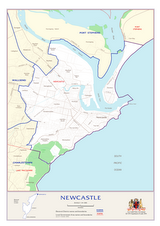An additional $103.5 million in annual funding is the centrepiece of the Greens election policy on disability services launched today by Sylvia Hale, Greens MP and spokesperson on Disability Services.
The extra money should be allocated to create an additional 300 supported accommodation places and 100 attendant care places for disabled people as well as an additional 600 respite care places to relieve the burden on carers.
Additional money should also go to providing faster access to equipment and relocating young disabled people out of aged care facilities.
Other initiatives in the policy include an additional $12 million for improved training for those who work with the disabled and a guaranteed 5 days per week of funding for disabled people participating in Community Participation Programs.
“The Greens recognise that great progress has been made in breaking down the physical, social and economic barriers that disable people. That progress has come about because of the outstanding advocacy of the disabled and those who represent them,” said Ms Hale.
“But that work must continue because many barriers still exist. It is the role of government to support that work, by listening to what the community is saying and committing the necessary financial resources and political will to removing those barriers,”
“The Greens will continue to push for these commitments because we know that our community is diminished without them.”
“In 2006 a draft international convention protecting the rights of persons with a disability was developed and the Greens look forward to seeing that convention adopted by the UN General Assembly and enacted by the Australian and New South Wales governments,” said Ms Hale.
“Closer to home the recognition by the Council of Australian Government’s (COAG) that significant additional resources must be given to address the needs of people with disabilities has given new impetus, particularly for those who have been campaigning for so long on behalf of young people in nursing homes.”
“It is imperative that this new momentum at international, national and state level be translated into delivering real improvements where it counts, on the ground, in the homes and care facilities, the workplaces and public spaces where people with disabilities live their lives.”
“The Greens policy on disability services was reviewed during 2006 by a working group made up mainly of members with a disability. The aim of that policy review was to ensure that Greens policy reflects the priorities of people who are disabled and our commitment to translate the recent impetus in this area into real outcomes.”
Greens Policy Initiatives
Accommodation
The Greens are calling for a major increase in funding for the disability sector targeted at improving access to a range of high quality, age-appropriate, community care and accommodation options with the aim of enabling people who are disabled to live as independently as desired or as possible. The Greens support the call by the NSW Council of Social Services in its Closing the Gap report for among other initiatives, an additional 300 supported accommodation places and 100 attendant care places at a cost of approximately $45 million per annum. In addition the Greens are calling for an additional $2.5 million to assist in relocating young people with a disability out of residential aged care.
Increased funding is also urgently needed to expand respite care services and facilities, in-home and emergency support and crisis accommodation. The Greens are calling for an additional 600 respite care places at a cost of approximately $5 million per annum.
Access
The Greens aim to ensure equitable and integrated community access, including the provision and maintenance of ramps, rails, toilets, information and communications systems and appropriate public and private transport options.
We also aim to ensure that people with disabilities have access to affordable and accessible communications technology and services that are appropriate to their needs; the Greens are currently undertaking an audit of all of our websites to ensure they meet best practice for accessibility and we are calling for similar audits of all public and corporate sector websites.
Equipment
The Greens are calling for an increase in funding to the PADP program (Program of Appliances for Disabled People) to at least $35 million per year to ensure that necessary equipment is provided in a timely manner.
Human Rights
The Greens will initiate legislative reform to ensure adequate protection of people with disabilities who are in care via improved monitoring, investigative powers and enforcement and the development and promotion of appropriate alternatives to the use of coercive measures and restraint in disability services.
Education
The Greens believe that there is a need to focus on the education system to ensure the appropriate case management and integration into childcare and school education of children who are disabled and to provide adequately resourced pathways that support school leavers with disabilities to make the transition from school into meaningful employment, educational and vocational programs or other community-based activities.
The Greens are calling for an additional $8 million per annum for teacher development programs, teacher release time and additional teachers aide support for school students with a disability, an additional $4 million per annum to ensure that Community Participation places are available for 5 days per week and that people who have completed the Transition To Work program without successfully finding employment are given access to the Community Participation Program.
Employment
We are calling for the expansion of funding to labour market programs for people with disabilities and the development of a program of affirmative action in employment so that those who want to work have the opportunity to do so to the maximum extent possible.
For those who are in jobs we need to improve the provision of infrastructure and interpersonal support available to support them in the workplace.
Disability services staff
The Greens recognise the importance of providing further training, development and personal support to staff working in disability services and the need to adopt workforce measures to increase the professional mix of staff. The Greens are calling for an additional $4 million per annum in development programs for staff working in disability services.
We also support a real increase in pay and improved conditions and career structures for providers of services for people with disabilities.
Carers
We recognise the importance of the role played by carers and to support that role the Greens are calling for parents, partners, relatives and friends who act as carers to be eligible for registration as carers and to have access to support, including income and respite.
TOTAL Additional Expenditure: $103.5m p.a.
Greens Policy Goals
The Greens policies seek to ensure that people of differing abilities have:
· a well funded and resourced operational service sector to meet their needs;
· access to adequate support services to enable them to participate fully in schools and society;
· the opportunity to actively participate in the development of policy and the planning and delivery of services;
· access to well-funded and resourced health services including provision of research funding and traditional and alternative treatment options;
· the right, where appropriate, to choose where, when and how to utilise the most appropriate medical, support or advocacy service that best meets their needs;
· the right to access the most suitable accommodation option that best meets their individual needs;
· the right to be free from discrimination, exploitation, neglect and abuse;
· the right to actively participate in civic and political life, including contesting elections and holding public office;
· the right to publicly dissent, protest and organise themselves in defence of their rights;
· involvement in all levels of decision and policy making across society, including in services for people who are disabled;
We support government programs to promote public awareness and attitudinal change by removing structural barriers and inequality of access to education, training and employment; as well as programs aimed at removing cultural and linguistic barriers to access to support and services.

















